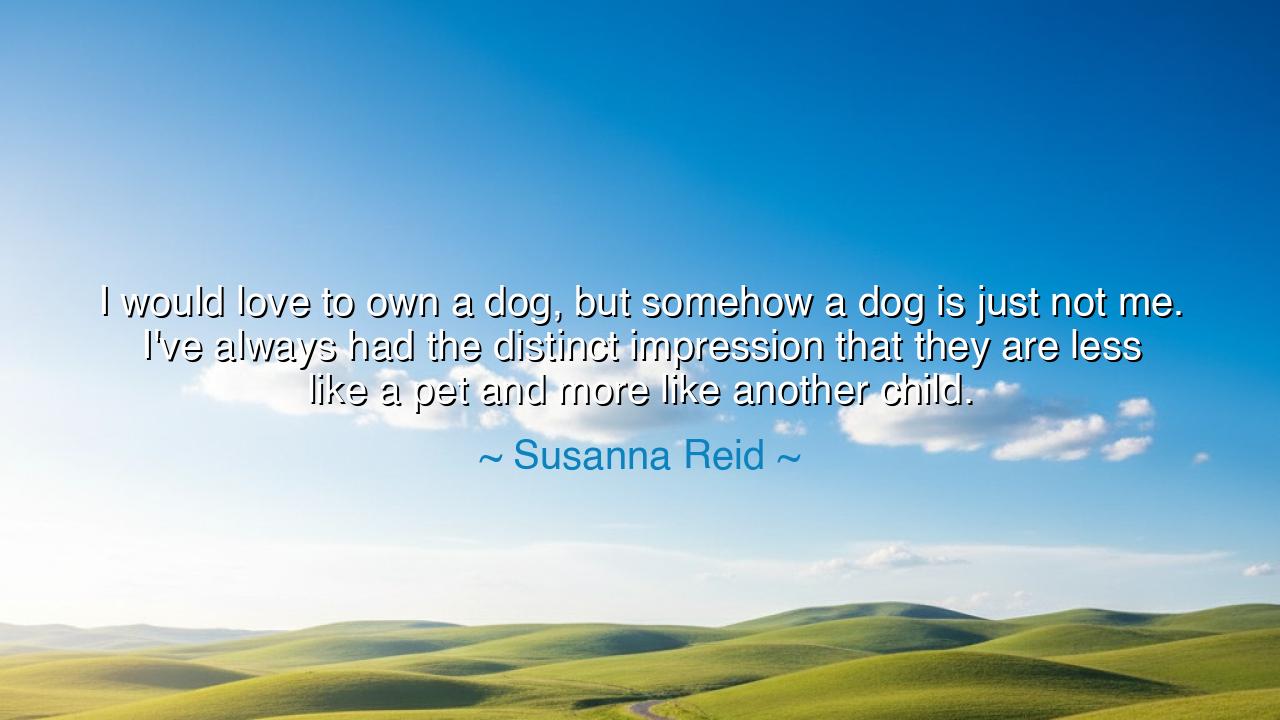
I would love to own a dog, but somehow a dog is just not me.
I would love to own a dog, but somehow a dog is just not me. I've always had the distinct impression that they are less like a pet and more like another child.






The broadcaster Susanna Reid once reflected with candor and tenderness: “I would love to own a dog, but somehow a dog is just not me. I've always had the distinct impression that they are less like a pet and more like another child.” These words, though spoken lightly, carry the resonance of ancient wisdom. For they remind us that to take in a creature of loyalty and need is no casual pastime, but an act of responsibility as sacred as raising a child. To call the dog “more like another child” is to honor its demands, its devotion, and its claim upon the human heart.
When Reid admits, “a dog is just not me,” she does not scorn the creature, but recognizes her own limitations. In this, she echoes the teaching of humility: to know oneself, to know what one can give and what one cannot, is a form of wisdom. Many in their pride take on burdens they cannot bear, only to falter and cause harm. But she, in her honesty, acknowledges that the care of a dog is not mere leisure, but a calling that demands patience, constancy, and love. In her words we hear the ancient counsel: do not take lightly the guardianship of a living soul.
To say the dog is less like a pet and more like another child is to pierce to the heart of companionship. For the dog, unlike other animals, binds itself wholly to its master. It looks not merely for food, but for guidance, comfort, and presence. It thrives not in solitude but in shared life. In this sense, the dog resembles a child who depends upon the parent’s steadfast love. To see this truth is to treat the creature not as property, but as family.
History offers us examples of this sacred bond. The story of Greyfriars Bobby, the little Skye Terrier of Scotland, who kept vigil for fourteen years at his master’s grave, illustrates that dogs embody a devotion as deep as any child’s love for a parent. Those who embraced him saw not an animal, but a soul bound by loyalty. The dog’s steadfastness shamed the fickleness of men and taught that guardianship must always be returned with gratitude and care. Reid’s reflection places her within this same tradition of reverence, recognizing the dog’s childlike spirit.
The origin of such understanding lies in humanity’s long kinship with dogs. Since the earliest fires were kindled in caves, the dog has sat beside us—guardian, hunter, companion. But in return, it has demanded not only food, but a place in the heart. Across cultures, the dog has been given names, buried with honor, painted in family portraits, mourned like kin. Reid’s words remind us that this ancient pact is not to be taken lightly: to accept a dog is to accept a lifelong bond, as one accepts the care of a child.
The lesson for us is clear: responsibility must match desire. It is not enough to say, “I would love to own a dog.” One must also ask: “Can I give the devotion it deserves?” For love, without responsibility, is only sentiment. True love is measured in sacrifice—walks in the cold, patience in the night, care in sickness, steadfastness until death. To treat the dog as less is to dishonor the centuries-old bond between species.
Practical action flows naturally. If you choose to bring a dog into your home, prepare your heart as though you were welcoming a child. Do not seek it for fashion, or vanity, or fleeting comfort, but because you are ready to give it loyalty equal to its own. If you cannot, as Reid wisely confessed, then honor your limits and choose another path. Better the humility to say no than the folly of unfulfilled promises.
Thus, the words of Susanna Reid shine with hidden wisdom: “They are less like a pet and more like another child.” Let future generations hear this as both praise and warning: praise for the sacred devotion of the dog, warning against the careless heart that treats devotion lightly. For to accept the love of such a creature is to be given the noblest of treasures—and the heaviest of responsibilities.






AAdministratorAdministrator
Welcome, honored guests. Please leave a comment, we will respond soon